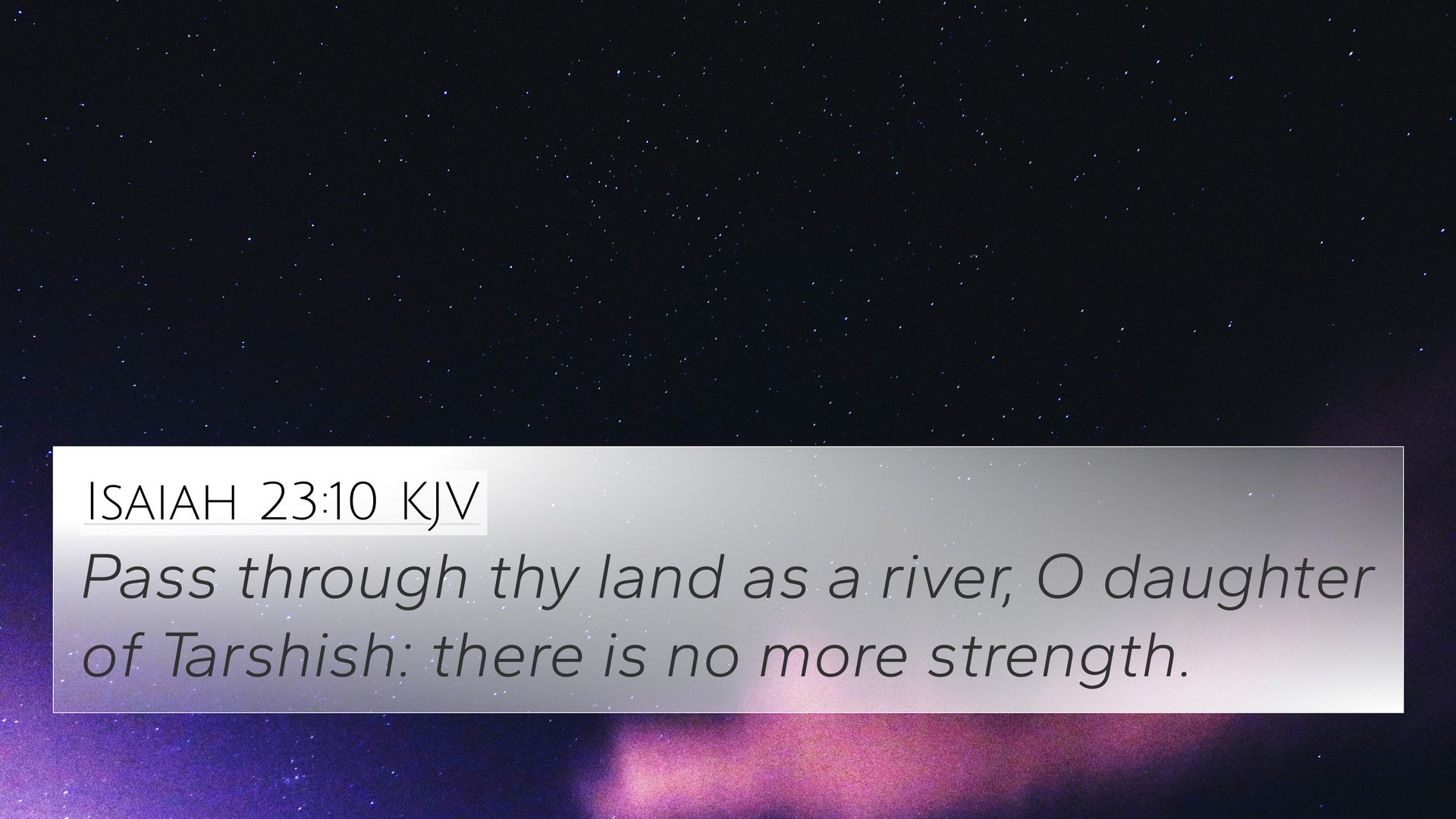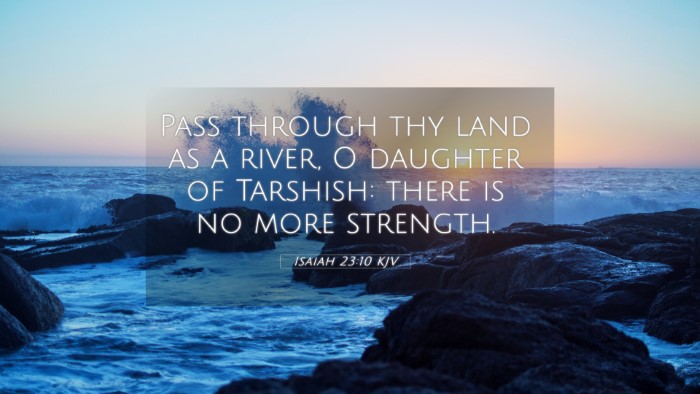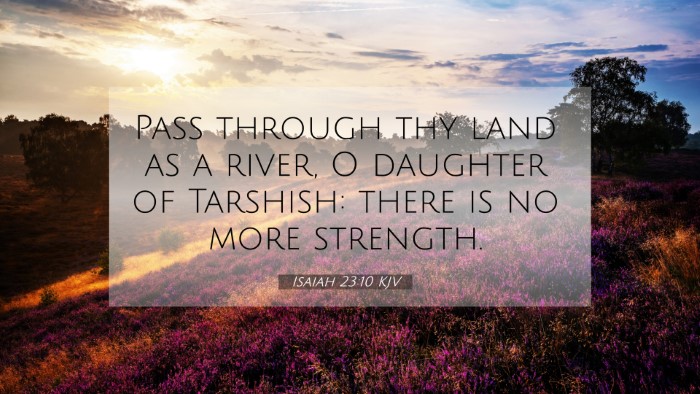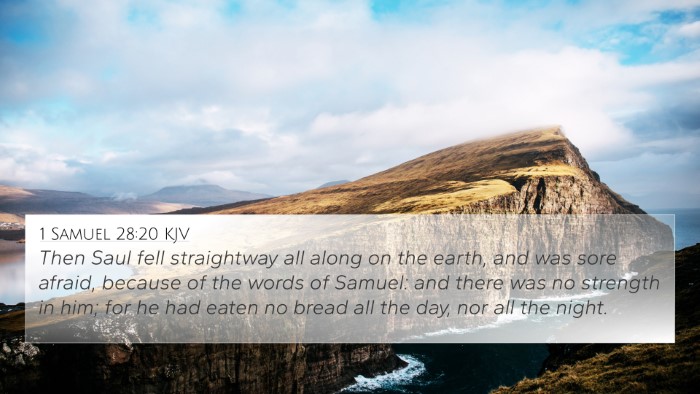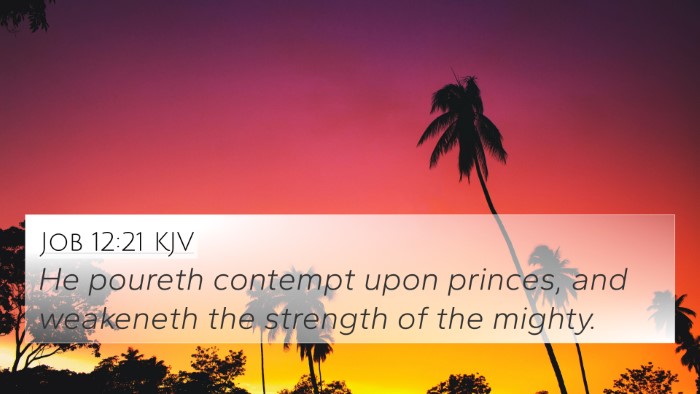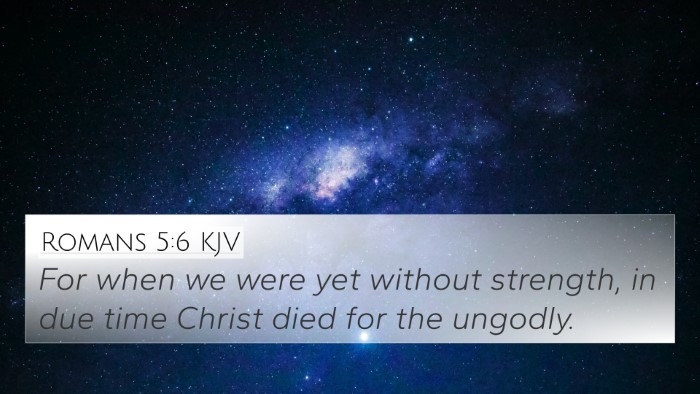Understanding Isaiah 23:10
Isaiah 23:10 states: "Pass through your land as a river, O daughter of Tarshish: there is no more strength." This verse speaks to the impending loss of strength and security for the region of Tyre and its allies. In its context, it offers profound insights into the themes of judgment and the transient nature of power.
Summary of Insights
This verse reflects a warning about the fate of Tyre, a significant commercial city, due to the divine judgment impending upon it. Insights from renowned commentaries help illuminate its meanings:
-
Matthew Henry: Henry emphasizes the metaphor of "the river" implying an unstoppable flow, symbolizing the overwhelming nature of impending calamity. The phrase "O daughter of Tarshish" suggests Tyre's position as a daughter city to the maritime powers. Henry interprets this as a warning of vulnerability, an indication that there is no remaining strength, highlighting a state of desolation.
-
Albert Barnes: Barnes details that the metaphor emphasizes the idea of exploitation and defeat. Tyre is portrayed as having lost its previous strength and capability to sustain itself. He notes that "passing through" the land signifies a form of desolation and abandonment as enemies will soon traverse its territory without opposition.
-
Adam Clarke: Clarke elaborates on the geographical significance of Tarshish, often associated with distant lands and trading routes. He reflects on the loss of trade and commerce that this prophecy signifies, interpreting it as a direct spiritual and political decline correlated with divine judgment.
Theme of Judgment and Loss of Power
This verse reflects themes of divine judgment where the economic strengths of nations collapse when under God's displeasure. This is consistent with biblical narratives addressing the consequences of pride and defiance against God.
Bible Cross-References
When studying Isaiah 23:10, several Bible verses provide relevant connections and insights into its overall meaning:
- Isaiah 14:32 - Addresses the fate of nations that oppress God's people.
- Ezekiel 26:17-18 - Prophecies concerning the downfall of Tyre and its implications for other cities.
- Jeremiah 25:22 - This verse reflects the judgment upon the "kingdoms of the isles" which are connected to the maritime power of Tyre.
- Amos 1:9-10 - Discusses the doom of Tyre for its transgressions and unmerciful actions against Israel.
- Revelation 18:10 - The fall of Babylon serves as a parallel to Tyre's fate, showcasing the ultimate fall of a mighty commercial empire.
- Isaiah 24:10 - Describes the desolation of cities in relation to God's judgment.
- Habakkuk 2:6-8 - These verses elaborate on the consequences of greed and the downfall of nations.
Connections Between Bible Verses
Isaiah 23:10 fits within a broader narrative throughout the Bible concerning the themes of economic power, judgment, and the eventual downfall of those who rise against God's people. Here are some significant connections with other verses:
- Linking Isaiah 23 with Revelation 18: Both passages underscore the destruction of prosperous cities as an act of divine judgment.
- Connecting Old Testament prophacies with New Testament teachings: Tyre's destruction acts as a precursor to the spiritual lessons found in the Gospels about pride and destruction.
- Comparing prophetic utterances: The prophecies given through Isaiah align with the sentiments expressed in Jeremiah's later reflections on Tyre’s fate.
Thematic Bible Verse Connections
The themes present in Isaiah 23:10 resonate effectively with various Biblical principles related to human frailty, divine authority, and judgment:
- Transitory nature of power as seen in Psalm 27:2.
- Consequences of pride highlighted in Proverbs 16:18.
- Judgment as inevitable for those opposing God found in Matthew 7:26-27.
How to Use Bible Cross-References
For effective Bible cross-referencing, utilize tools such as Bible concordances and cross-reference guides to deepen your understanding of interconnected scriptures. Engaging with different translations can also offer varied insights into how these themes play out throughout the biblical narrative.
Conclusion
In conclusion, Isaiah 23:10 serves as a profound reminder of divine judgment and the consequences of relying on worldly power. By examining the interrelated verses and themes, we gain a deeper comprehension of not only this particular prophecy but also how it fits within the larger biblical discourse on judgment, restoration, and the ultimate sovereignty of God.
